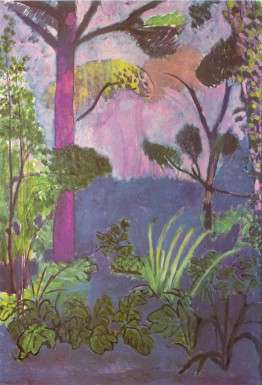The Graft.
...every thesis is (bands erect) a prosthesis; what affords reading affords reading by citations (necessarily truncated clippings, repetitions, suctions, sections, suspensions, selections, stitchings, scarrings, grafts, pastiches, organs without their own proper body covered with cuts, traversed by lice). Thus does a text become infatuated. With another. This does not happen without profit or loss for the organism that undergoes grafting after having been solicited, collared.
Jacques Derrida, Glas.

[Matisse] later recalled that the Villa Brooks garden "was immense, with meadows as far as the eye can see. I worked in a part which was planted with very large trees, whose foliage spread very high. The ground was covered with acanthus. I had never seen acanthus. I knew acanthus only from the drawings of Corinthian capitals I had made at the Ecole des Beaux-Arts. I found the acanthus magnificent, much more interesting, green, than those at school!"
These recollections evoke the 'Acanthus, Moroccan Landscape' (Les Acanthes, paysage marocain) canvas, one of Matisse's greatest landscapes. The classical associations of the acanthus are consistent with French thinking about North Africa as part of the former Carthaginian and Roman empires, still evidenced by the extensive ruins at Volubilis in Morocco, Tipasa in Algeria, and El Djem in Tunisia. (Colonial rhetoricians like Louis Bertrand were happy that France had reclaimed from the Arabs these territories of the original ‘Latin’ people).
Roger Benjamin, Orientalist Aesthetics: Art, Colonialism and French North Africa, 1880-1930.
l’Afrique nous offre, avec la joie de son ciel, dont nous sommes avides, l’activité réglée qui nous convient: nous n’y perdons point notre sens inné de la mesure, pour sombrer dans les aventures de toutes les mégalomanies. Ensuite, nous y restons en contact avec les traditions de culture qui ont formé notre race. Héritiers d’Athènes, d’Alexandrie et de Rome, nous sommes chez nous à Carthage, où les courans de civilisation partis de ces trois villes sont venus se confondre.
Louis Bertrand, “Nietzsche et la Méditerranée."

Jacques Derrida, Glas.

[Matisse] later recalled that the Villa Brooks garden "was immense, with meadows as far as the eye can see. I worked in a part which was planted with very large trees, whose foliage spread very high. The ground was covered with acanthus. I had never seen acanthus. I knew acanthus only from the drawings of Corinthian capitals I had made at the Ecole des Beaux-Arts. I found the acanthus magnificent, much more interesting, green, than those at school!"
These recollections evoke the 'Acanthus, Moroccan Landscape' (Les Acanthes, paysage marocain) canvas, one of Matisse's greatest landscapes. The classical associations of the acanthus are consistent with French thinking about North Africa as part of the former Carthaginian and Roman empires, still evidenced by the extensive ruins at Volubilis in Morocco, Tipasa in Algeria, and El Djem in Tunisia. (Colonial rhetoricians like Louis Bertrand were happy that France had reclaimed from the Arabs these territories of the original ‘Latin’ people).
Roger Benjamin, Orientalist Aesthetics: Art, Colonialism and French North Africa, 1880-1930.
l’Afrique nous offre, avec la joie de son ciel, dont nous sommes avides, l’activité réglée qui nous convient: nous n’y perdons point notre sens inné de la mesure, pour sombrer dans les aventures de toutes les mégalomanies. Ensuite, nous y restons en contact avec les traditions de culture qui ont formé notre race. Héritiers d’Athènes, d’Alexandrie et de Rome, nous sommes chez nous à Carthage, où les courans de civilisation partis de ces trois villes sont venus se confondre.
Louis Bertrand, “Nietzsche et la Méditerranée."


0 Comments:
Post a Comment
<< Home